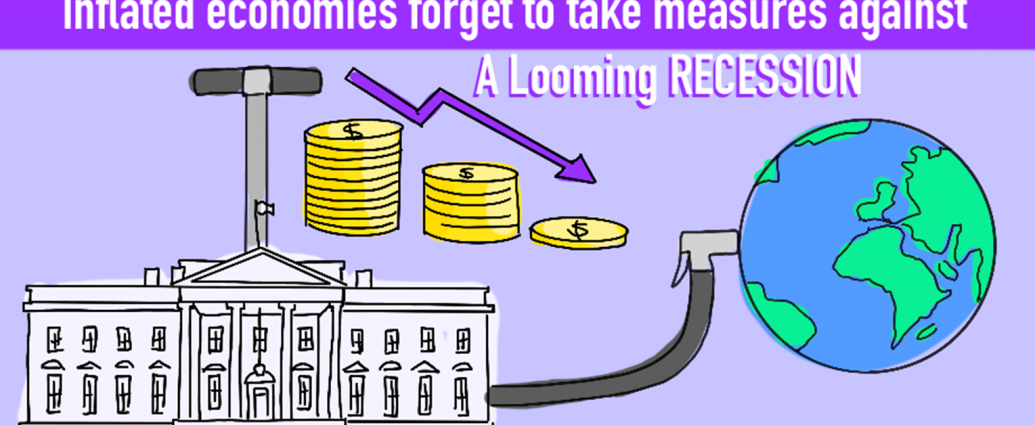Author: Emma Eeckhout, Graphics: Caroline Yee
The BRB Bottomline
2021 was a very positive year for economic growth worldwide. Nevertheless, rumors of a looming recession are becoming more of a reality. Europe’s increased gas prices, China’s Omicron outbreak, and the US’s rapid inflation are blaring threats to an economic downfall that could have been avoided.
In the past year, we have seen an outstanding comeback from the effects of the pandemic, causing the US and European economies to boom. The US has regained 90% of the workers lost in the early weeks of the pandemic with employers adding 400,000 new jobs in March alone. Nevertheless, this success is short lived as whispers of a recession grow louder. Inflation rates are starting to skyrocket, along with rising wages and prices. The Federal Reserve (Fed) is preparing to battle this by raising interest rates and shrinking the balance sheet. Can the Fed pull off yet another “soft landing” and avoid a recession?
Triple Threat
First of all, Europe is going to face high inflation soon, caused by the conflict in Ukraine. Western sanctions threaten energy supply to the continent, driving up energy prices. Gas prices for the next winter are five times higher than in America and spending on household energy as a share of GDP is twice as high. It has reduced consumer’s spending power and made factories costlier to run. If Europe decides to stop importing Russian gas all together, the danger of a recession rises steeply.
Secondly, China’s most recent outbreak of Omicron has returned some of its largest cities back into complete lockdown. Despite these drastic measures about 20,000 new cases were reported on April 6th. If previous lockdown stats hold true, China’s output will be 7.1% lower than in a world with no restrictions. This lockdown disrupts Chinese exports to the global economy, while also taking a toll on consumer confidence. China’s “zero-covid” approach to the outbreak will make lockdown a remaining factor in the economy and act as a source of global volatility.
Thirdly, in recent months the unemployment rate in the US has gone down to 3.6%, which is barely above pre-pandemic levels and is in itself at a half-century low. America has twice as many job openings as it does unemployed workers, which is the highest ratio in the past 70 years. Nevertheless, wages are rising attributed to increasing prices. Consumer price inflation and hourly wages are 7.9% and 5.6% higher than last year respectively, and are only increasing. Demand for cars, homes, restaurant meals and for the workers to provide these services has outstripped the supply chain which has led to the fastest increasing inflation in 40 years. This is significantly higher than the benchmark 2% target inflation rate from the Fed. In order to cool down inflation there has to be an aggressive raise in interest rates that should have started last year.
All three of these effects that threaten an economic recession could have been avoided by policy makers. Europe became wholly dependent on Russian natural gas and is now struggling to do right by Ukraine. China’s difficulty to suppress Omicron was extremely avoidable given how the rest of the world has been able to keep Omicron at bay. Today’s recession scare was avoidable, with the blame pointed straight at policymakers who never cared to fix long-term issues.
“Soft landing” or plummeting recession
Given the accelerating nature of inflation, it is time to find a solution to accommodate a “soft landing” and avoid a recession altogether. There are 11 million open jobs and fewer than 6 million unemployed workers, there are more home-buyers than homes on the market and more car-buyers than available cars. The Fed can now only slowly raise interest rates and make it more expensive to borrow. Hopefully, this will curb demand without causing employers to start cutting jobs. It is expected to raise short-term interest rates which started the year below 0.25% to 2.5% in December. Rates in the new year are projected to reach 3% by 2023.
Fortunately, most forecasters believe that a recession in the next year is unlikely. High oil prices, increasing interest rates and diminishing government aid will definitely decelerate the US’s price pressures. However, corporate profits continue to be strong, households have trillions of dollars in savings and debt loads are low, all of these should provide a cushion for any slowdown in the economy, which can postpone a recession to the following year.
Take-Home Points
- During 2021 there was an incredible economic growth mostly due to an increase in jobs fueled by the pandemic recovery and government issued aid.
- This economic prosperity, however, has been taken for granted and now several countries are facing increasing prices and inflation.
- European countries have been affected by the conflict between Russia and Ukraine, China has been hit with an aggressive Omicron outbreak and the US has shot its supply chains with an excess in demand.
- The US has found that slowly increasing interest rates is the only solution, yet we have yet to see if they will pull off a “soft landing”.
- Despite there being a potential recession it will not come to be until the following year.

